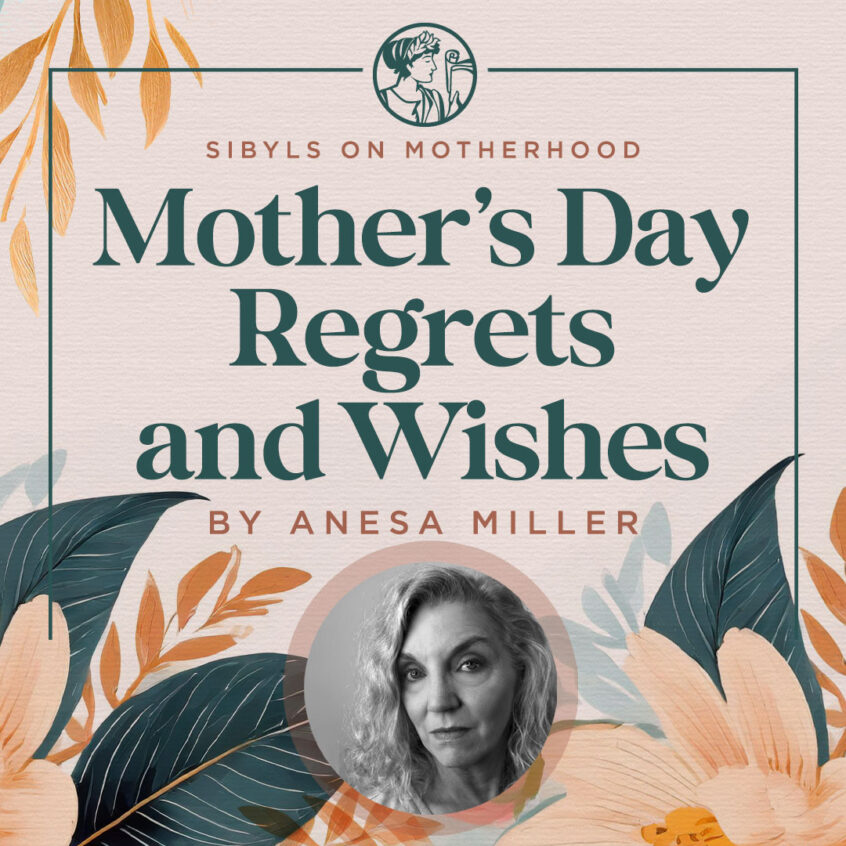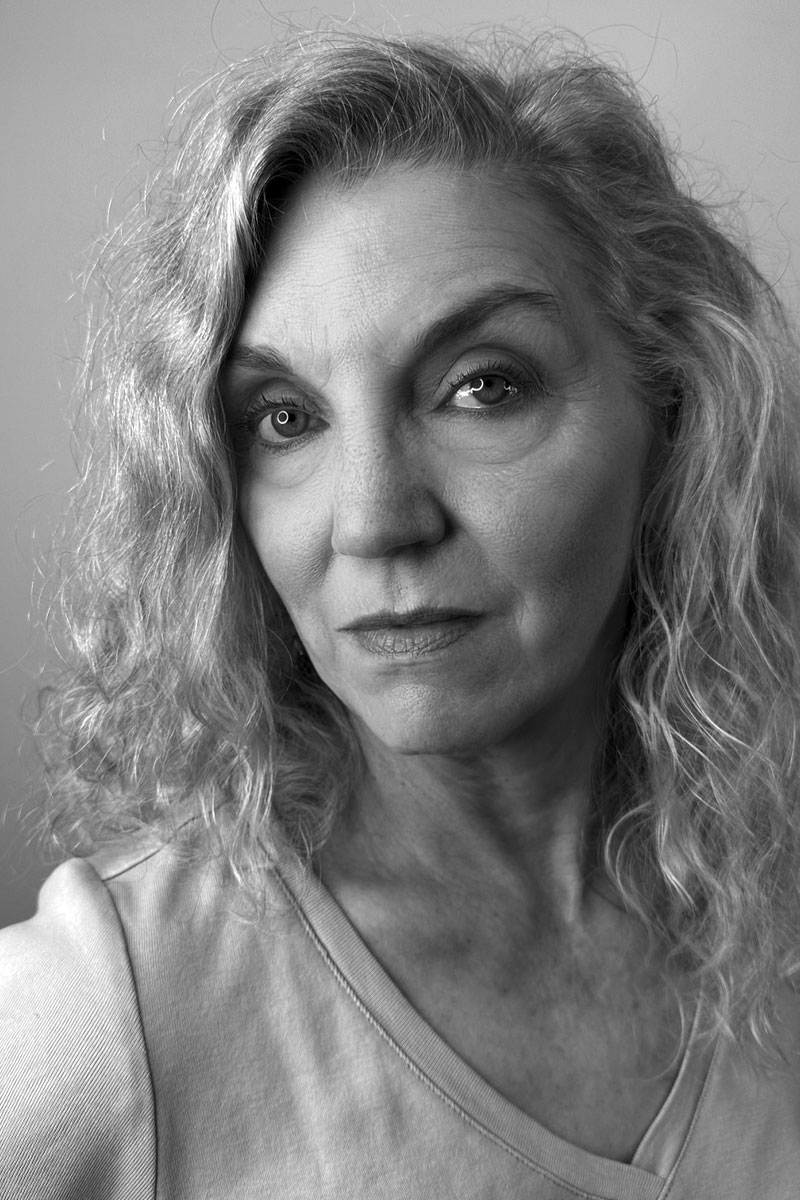from the Sibylline Press Series: Sibyls on Motherhood
Mother’s Day Regrets and Wishes
by Anesa Miller
At a workshop on collage-making a while back, everyone was struck when Robin broke down in tears. She said the image she’d created from multicolored triangles symbolized regret. In a painfully quavering voice, she told us she was sorry she never had children. She wished her life had turned out differently.
Afterward, I called Robin hoping to share some moments of friendship and, maybe, a different perspective. We made plans, but Robin canceled, a pattern that repeated over the next several months. Maybe she didn’t want to revisit her regrets. Or maybe she sensed I might say something she had no desire to hear.
Of course, I’m guessing. Robin and I never did reconnect. And maybe the perspective I wanted to air was better for me to ponder on my own: Women who don’t have children are spared an unforeseeable world of heartache. Maybe a small world, a brief one, or maybe a vast universe. Any regret they experience should perhaps be weighed against the pain they dodged like a bullet.
About six months before the collage workshop, my firstborn daughter (age 39) had announced that my violations of her boundaries made it unacceptable for me to visit or spend time with her family, including my only grandchild. An example of boundary violation that Beth (not her real name) offered was that I had tried to persuade her to stay at my house, instead of her preferred B&B, on my first Christmas as a widow after my 26-year marriage to her stepdad.
This complaint never surfaced before. Although Beth’s father and I divorced when she was nine, she had spent Christmases in my home all her life, through college, grad school, and at least once since her marriage. And hadn’t she turned to me for help — moral, logistical, and financial — when she moved her family to Canada for work? I kept the baby out of harm’s way while furniture and boxes emerged from the truck. I cleaned kitchen cupboards and window shades, all at Beth’s request. If that was interference, she made no accusations at the time.
Her embrace of distance from me (and a bit later, also from her father) escalated over the next few years. All calls went to voicemail, messages never returned. Soon, I figured out she had blocked me on phone and email. She and her husband used to share photos and videos via a cloud service. That not only came to a stop, but all the older photos abruptly disappeared. A picture of Beth with her father (my ex) on a trip to Europe, which formed part of a montage in the “Personal” section of her professional website, also vanished.
No explanations were forthcoming. Kindly replying to text messages, my son-in-law said he was very sorry about the situation, but Beth needed some time to sort out her feelings. He had clearly been forbidden to say more. In the first couple years of her silence, flowers still arrived on Mother’s Day and a gift at Christmas. I still sent gifts and cards, especially to my grandchild. But the last time I was allowed to video-chat, I discovered that my gifts had not been opened, were never given to the baby, now seven years old, that I’d been asked to protect from heavy boxes.
After five years, the withdrawal is complete.
Was I a terrible mother? Did I violate boundaries? Yes, I broke some dishes in my children’s presence and got drunk and sobbed uncontrollably on more than one occasion when we were all in the throes of divorce. Yes, I slapped my daughter when she claimed I had no right to take her illegal drugs away at age 16. Yes, I had her arrested at age 27 when she became addicted to opioids and stole money from everyone in our family. She wouldn’t speak to me for the first six months of her court-ordered recovery, but eventually she reached out and admitted that, yes — her life had been hanging by a thread. She seemed to accept that I had tried to save her, and she wanted me in her life again.
She stayed in a halfway house for a full year. Landed a good job, got an apartment. Then went to grad school, met a man and got married, got pregnant. Landed her dream job, moved to Canada. Through all of that, she still wanted her parents in her life. We threw her a graduation party and a wedding reception. The sad old days seemed behind us at last.
So what happened? Maybe — I’m thinking — now that she has a child of her own, past failings frighten her more than they did when she was climbing out of them. Maybe stress makes her fear for her recovery — backsliding always being one hit away. Maybe her parents, who saw the worst, bring unbearable reminders, or an unspoken pang of shame.
Of course, I’m guessing. Beth has never voiced her complaints beyond the abstract boundary issue. At times, I wonder if it’s a simple matter of convenience. Maybe aging parents are a handy item to jettison amid the demands of home, marriage, dream job, and child. I run across articles about the increasing numbers of young adults who find they’re happier without family obligations.
I grieved, struggled with insomnia, nightmares, depression. I devised desperate plans of heading to Canada, renting a car and staking out the house I helped buy and furnish, surveilling my estranged family as they hustle out in the morning and drive their child to daycare. Or now, to elementary school. Could I linger in the park, stroll past classroom windows? Might I catch a glimpse of the grandchild I love? Or should I go straight to the front door and knock? Confront, beg, demand?
At present, the acute phase of my griefs has passed. I can see these desperate plans for invading Beth’s life as just that: desperate devices to escape my loneliness. Violations of her wishes, unlikely to lead to the longed-for reconciliation.
And it is pointless to panic. Some family estrangements do get resolved. Maybe my son-in-law was right — Beth just needs some time apart. Not necessarily the rest of her days.
Meanwhile, it turns out that I have a full and meaningful life. I can laugh with friends and appreciate good relationships with my younger children. It’s worth realizing that a mother may lose her offspring to the natural process of their independence, to a shocking tragedy, or to a choice of increasing distance. I wish I could assure women who feel they missed out by not rearing young that joy isn’t all they missed. I hope we can focus on what we’ve managed to build and keep, not on the losses that so easily crush our hearts.
About Anesa Miller
Anesa Miller is a native of Wichita, Kansas, a graduate of the University of Idaho, a long-term resident of Ohio, and recipient of an Ohio Arts Council Fellowship for creative writing. Her fiction, essays, and poetry have appeared widely, and her previous novel, Our Orbit, was a finalist in regional fiction in the Next Generation Indie Book Awards.
 Anesa Miller is the author of I Never Do This: A Novel published in April 2024 by Sibylline Press. Click here to purchase her book.
Anesa Miller is the author of I Never Do This: A Novel published in April 2024 by Sibylline Press. Click here to purchase her book.



